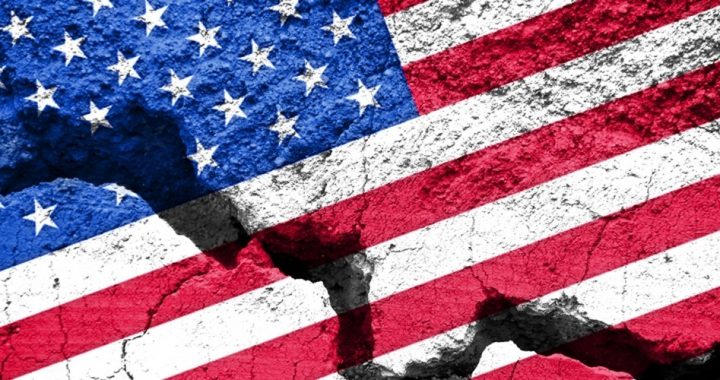
With a poll last year finding that almost 70 percent of Americans believe another civil war is imminent, many today wonder if our divisions are as severe as they were before our 1861 conflict. Addressing this question Monday at PJ Media, Robert Spencer concludes that they absolutely are not.
The ones today are far, far worse.
“That doesn’t necessarily mean that we are headed for a shooting war,” Spencer then writes — “but we certainly may be.”
Making his case, he writes that despite the Civil War’s 1861 eruption, we truly were “countrymen” at the time.
“Both sides revered Washington, Jefferson, and the other Founding Fathers,” Spencer points out, relating the first of many commonalities. “Confederate spokesmen often termed the war their own war for independence, insisting that it was a new iteration of the same desire for self-determination that had led to the American war of independence against Britain.”
In contrast, while esteem for the Founders is diminished today overall, conservatives still respect those great men, yet our Left demeans them as bigoted, slave-owning “dead white males” whose statues should be toppled.
Continuing, Spencer writes that both “sides respected the United States Constitution to the extent that the Constitution of the Confederate States of America was essentially a copy of that of the nation the Confederates were leaving, with a few minor modifications. It protected the freedom of speech, the freedom of the press, and the freedom of religion; it allowed for ‘the right of the people to keep and bear arms,’ it protected citizens from unreasonable search and seizure, and contained numerous other provisions taken from the earlier Constitution.”
Yet while understanding of the Constitution today is diminished overall, conservatives still respect and often cherish it; the Left, however, considers the document a “progressivism”-impeding rotten fruit of a backward and bigoted time. Leftists want to scrap the Second Amendment in particular and even take issue with the First, as they want to criminalize “hate speech” (as they define it).
Spencer then points out that even the original Confederate flag was similar to the Union one. In fact, it was alike enough to cause battlefield confusion, resulting in the adoption of what’s now viewed as the Confederate flag: the flag of the Army of Northern Virginia.
In contrast, a “flag of Leftist America is more likely to feature a hammer and sickle than stars and stripes,” notes Spencer.
He next mentions how even Abraham Lincoln spoke of the two sides’ similarities, saying, “Both read the same Bible, and pray to the same God; and each invokes His aid against the other.”
Today, however, the Left openly demeans Christianity, with some leftists classifying biblical passages as hate speech. Moreover, liberal politicians have done their best to shutter churches during the pandemic, treating religious worship as a “non-essential” activity while keeping liquor stores and prenatal-infanticide mills open (reflecting what they really consider sacred).
This brings us to other profound differences between 1861 and today. Antebellum Americans North and South and everywhere essentially agreed on prenatal infanticide, on what constitutes proper sexuality, on what marriage is, that the border should be secure, that illegals deserve no citizenship-type rights, that balkanization is destructive, that Western Civilization is a positive force, and understood there are only two sexes. They were united on these and other fundamental issues.
Of course, there still were cultural/regional differences in 1861, but we nonetheless were far closer to being one people, one nation, under God. Today we’re not just divided but fractured, and not only racially and ethnically but religiously, ideologically, and philosophically, from soup to nuts. If America were a marriage, it would be a confusingly polygamous one — and a split would have occurred long ago over irreconcilable differences.
A major, and deep, reason for our fracturing is seldom noted, but it’s something of which I’ve often warned: the relativism sweeping Western Civilization. When people believe in Truth — absolute, unchanging, universal, and eternal by definition — they’re more likely to seek it, govern their lives by it, and can be united by it.
Of course, differences in perception of Truth can cause division as well; ergo, theological disputes. Yet nothing leads to fracturing as fast as believing divinely-created rules (Truth) for governing humanity don’t exist at all. For upon embracing the Protagorean lie “Man is the measure of all things” and everything is thus all relative, people tend to do what’s most convenient: Make everything relative to themselves. It’s a recipe for possibly having as many “cultures” in a land as there are people.
This would be destructive anywhere, but it’s especially dangerous, perhaps, in a diverse country in which there’s no common race and ethnicity — no common “national family” — to serve as a unitive force. What’s supposed to unite us, love of hot dogs and French fries? (Count the vegans and body cultists out on that score. Yeah, we’re divided dietetically, too.)
While this fractured state can’t be easily remedied, the best thing America can do is grow up philosophically and dispense with the childish relativism. Saying “That’s your truth” or “Everything is shades of gray” (50?) does preserve an illusion we’re without sin, but it won’t preserve civilization.
In fact, it has gotten so bad that we’re now even divided mathematically, with some leftists saying, 1984-style, that 2+2 can equal 5 (as if we needed additional stupidity).
When a country is so divided from reality that it’s arguing over what boys and girls are and simple math, a hard lesson in division may lie down the road.
Image: Delpixart/iStock/Getty Images Plus
Selwyn Duke (@SelwynDuke) has written for The New American for more than a decade. He has also written for The Hill, Observer, The American Conservative, WorldNetDaily, American Thinker, and many other print and online publications. In addition, he has contributed to college textbooks published by Gale-Cengage Learning, has appeared on television, and is a frequent guest on radio.



